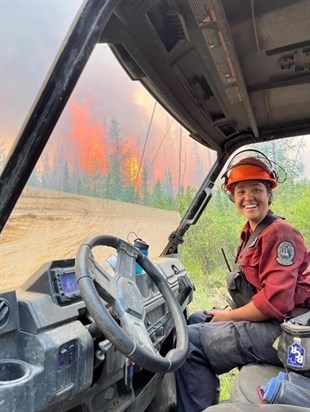
BC Wildfire service firefighter Devyn Gale is seen in an undated handout photo. Nineteen-year-old Devyn Gale was killed when a burning tree struck her during firefighting operations near Revelstoke last July.
Image Credit: THE CANADIAN PRESS/HO-BC Wildfire Service
August 15, 2024 - 8:36 AM
LANGLEY, B.C. - A report from British Columbia's worker safety agency says the potential dangers of a burning cedar tree were identified but not acted upon before it fell, killing a young wildland firefighter and injuring two others last summer.
WorkSafeBC's 21-page incident investigation report highlighted ineffective hazard management, inadequate supervision, training and orientation of young workers, unsafe work procedures and normalization of risk.
Nineteen-year-old Devyn Gale was killed when a burning tree struck her while she was fighting a wildfire northeast of Revelstoke last July.
"Even though the hazard of the burning cedar was reported, no actions were taken to eliminate or mitigate the risks," said the report dated July 2, 2024. "This contravenes regulatory requirements, as well as the procedures outlined in the Wildlife/Dangerous Tree Assessor Course, the fire crew training standard and (BC Wildfire Service's) safe work procedures."
The report said firefighters working near Gale "heard a loud cracking noise, like that of a tree falling," but their attempts to call her were met with no response and when they went to check on her she was found on the ground with fatal injuries.
Premier David Eby said Wednesday that he directed the BC Wildfire Service to enact reforms identified in the WorkSafeBC report as safety failures in Gale's death on July 13, 2023.
He said it was clear something went "tragically wrong" and reforms must be implemented to ensure workers are supported and receive training to prevent injuries and death.
“It was very apparent given Devyn’s death that something had gone tragically wrong on the site,” he said. “There’s no question that people who sign up for the wildfire service are signing up for an inherently risky and difficult job. But it should never be risky or dangerous because of a lack of training, because a concern that somebody raised about safety wasn't acknowledged in the way that it should have been."
Eby said during an unrelated news conference that he's been told "significant changes" have already been made, including ensuring that young firefighters "have the protections they deserve."
Eby attended Gale's funeral last year in Revelstoke, where hundreds of city residents lined a memorial procession route of BC Wildfire firefighters and first responders.
The WorkSafeBC findings, first reported by the CBC, which obtained them through a freedom of information request, said "there is no evidence that a dangerous tree assessment had been completed on the burning cedar at the site before workers began their work."
The report identified six violations of the Occupational Health and Safety Act and B.C. Wildfire Service regulations, including failure to provide its workers with adequate information, instruction, training and supervision to ensure its workers’ safety, and failure to ensure that activities involving bucking trees are adequately planned.
WorkSafeBC says its mission is to "prevent workplace injury, illness and death and support injured workers through fair compensation and effective rehabilitation."
Paul Finch, president of the B.C. General Employees’ Union, said it has been calling on the BC Wildfire Service to "change its culture of normalizing risks."
“The systemic issues identified in the report should not be read as criticism of individual firefighters doing their best to protect the province during increasingly difficult wildfire seasons,” Finch said in a statement.
Finch said the wildfire service has been unable to retain experienced staff, which has put many workers in dangerous situations because processes like completing dangerous tree assessments and implementing safety training are falling by the wayside.
“To end the retention crisis, the BCWS must take the steps needed to make wildland firefighting a safe and sustainable career, by providing adequate compensation for junior and mid-level leadership roles and ensuring appropriate staffing throughout the season,” Finch said.
This report by The Canadian Press was first published Aug. 14, 2024.
News from © The Canadian Press, 2024